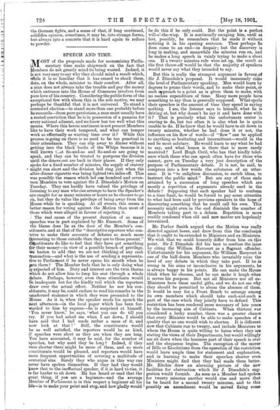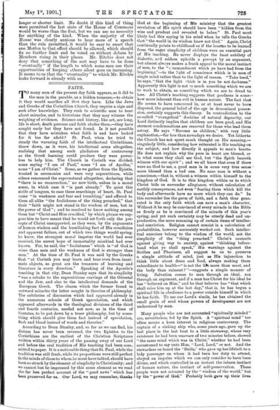SPEECH AND TIME.
MOST of the proposals made for economising Parlia- mentary time make shipwreck on the fact that tierabers do not greatly mind its being wasted. Indeed, it is not very easy to say why they should mind a result which, Aile it is so familiar that it has ceased to shock them, does, on the whole, minister to their comfort. After all, a than does not always take the trouble and pay the money which entrance into the House of Commons involves from pure love of his country. Considering the public form of the exceptional-few with whom this is the sole motive, we may perhaps be thankful that it is not universal. To stand a contested election—to stand more than one probably before he succeeds—from pure patriotism, a man must usually have a rooted conviction, that he is in possession of a panacea for every national ailment, and we know but too well what this means. Where this heroic sentiment is not present Members like to have their work tempered, and what can temper work so effectually as wasting time over it? While this process is going on there is no need to be too punctual in their attendance. They can slip away to dinner without getting into the black books of the Whips because it is well known that So-and-so and So-and-so are going to speak, and they can be trusted to postpone the division tuitil.the diners-out are back in their places. If they only spoke for a fixed number of minutes, the supply of oratory • might run short and the division bell ring just when the after-dinner cigarette was being lighted two miles off. This was possibly the reason which led OM Inuxdred and seven- teen Members to vote against Sir J. Dimsdale's Motion on Tuesday. They can hardly have valued the privilege of listening to any man who can arrange to have the Speaker's eye caught for as many minutes or hours as he chooses to go on, but they do value the privilege of being away from the House while he is speaking. At all events, this seems a better reason for voting against the Motion than most of those which were alleged in favour of rejecting it.
: The real cause of the present duration of so many speeches was in part explained by Mr. Emrnott. Some of o blame does lie at the door of the Member's con- stituents, and at that of the "descriptive reporters who con- trive to make their accounts of debates so much more ,OttereSting to those outside than they are to those present." 001pstituents do like to feel that they have got something Or their money—in view of a possible breach of privilege, we hasten to add that we are not thinking of any cash transaction—end what is the use of sending a representa- tive to Parliament if he never opens his 'mouth when he kets there ? The Member feels that he is only doing what eipwted of 'him. Duty and interest are the twin thorns which do not allow him to keep his seat through a whole debate. Perhaps, however' even these stimulants would lye' inadequate but for the kindly veil which the reporters draw over the actual effort. Neither he nor his con- stituents, it may be, could endure- to read his remarks in the unadorned stammer in which they were presented to the House. As it is, when the speaker reads his speech the next afternoon—in the local paper which has been for- Warded to him by express—he is surprised at himself. 'You never know,' he says, what you can do till you try. If you had asked me when I sat down, I should ha,ve said that I had made rather a mess of it, and now look at that ! ' Still, the constituents would be as well satisfied, the reporters would be as kind, if speeches were short as they are when they are long. You have accounted, it may be said, for the number of speeches, but why need they be long ? Indeed, if they were shorter there might be more of them, and so more constituents would be pleased, and reporters would have more frequent opportunities of covering a multitude of oratorical sins. Surely they who argue in this way can never, have spoken themselves. If they had they would know that to the ineffectual speaker, if it is hard to rise, it islar harder to sit down. He has heard or read that the great thing, if yen are a beginner..and the average Member of Parliament is in this respect a beginner all his to make your point and stop, and how gladly would he do this if he only could. But the point is a perfect will-o'-the-wisp. It is continually escaping him, until at last, possibly, he remembers that he made it without noticing it in his . opening sentence. Then perhaps to does come to an end—in despair; but the discovery is long in making, and meanwhile the minutes run on, and he makes a long speech in vainly trying to make a short One. If a twenty minutes rule were set up, the result at the first throw-off would be that the majority of speakers would never say what they intended to say.
But this is really the strongest argument in favour of Sir j. Dimsdale's proposal. It would immensely *Se the level of Parliamentary speaking. Men would learn by degrees to prune their words, and to make their point, or such approach to a point as is given them to make, with no useless expenditure of time. Many more people have something to say than is generally supposed. What spoils their speeches is the amount of time they spend in saying nothing. I see, the listener says to himself, what he is driving at, but why doesn't he say it and have done with it? That is precisely what the unfortunate orator is craving to do, but too often it is also what he is quite unable to do. If he knew that he would have to sit down in twenty minutes, whether he had done it or not,' the influence on his flow of words—if " flow " can be applied to anything so hesitating and intermittent—would in the end be most salutary. He would learn to say what he had to say, and what lesson is there that is more rarely mastered ? Lord Hugh Cecil, who has that kindly toler- ance which those who can speak often have for those who cannot, gave on Tuesday a very just description of the purpose of Parliamentary debate. It is not, he said, to compress into a few words the substance of an utter- ance. It is "to enlighten discussion, to enrich ideas, to instruct the public mind." But are any of these ends attained by a succession of long speeches which are mostly a repetition of arguments already used in the debate ? Supposing that each speaker had to conform to a time limit, he would be forced to pay some attenti6n to what had been said by previous speakers in the hope of discovering something that he could call his own. This necessity might even in the end diminish the number, of Members taking part in a debate. Repetition is more readily condoned when old and new matter are hopelessly intermixed.
Mr. Parker Smith argued that the Motion was really directed against bores, and drew from this the conclusion that it ought to be extended to Ministers and ex-Ministers. We wish that we could honestly differ from him on this point. Sir J. Dimsdale did his hest to confuse the issue by citing Sir William Harcourt as a flagrant offender. Unfortunately for his argument, Sir William Harcourt is one of the half-dozen Members who invariably raise the level of any debate in which they take part. If he wrong in his aims or inconclusive in his arguments, he is always happy in his points. He can make the House think when he chooses, and he can Make it laugh when it serves his purpose. But not all Ministers nor all ex- Ministers have these useful gifts, and we do not see why they should be permitted to abuse the absence of them. It would be easy for a Front Bench to arrange among its own members which should take such-and-such a part of the case which they jointly havc to defend. This restriction has been renderel more necessary of late years by the increasing siie of Cabinets. When thirteen was considered a lucky number, there was a greater chance that every Minister would be able to make speeches of a quality that no one would wish to shorten. It is different now that Cabinets run to twenty, and include AFinisters to whom the House is quite willing to listen when they are stating the views of their Departments, but would willingly see sit down when the business part of their speech is over and the eloquence begins. The exemption of the mover of Bills or Resolutions from the operation of the restriction would leave ample time for statement and explanation, and in learning to make their speeches shorter even Ministers might find that they had made them better. Mr. Ritchie drew an alarming picture of the new facilities for obstruction which Sir J. Dimsdale's sug- gestion would furnish. As soon as a Member had spoken for twenty minutes another would rise and move that he be heard for a second twenty minutes, and to this possibly an amendment would be moved fixing some
longer or shorter limit. No doubt if this kind of thing were permitted thelast state of the House of Commons would be worse than the first, but we can see no necessity for anything of the Lind. When the majority of the House was clearly anxious to hear more of a speech &an the rule permitted, it would be easy to enact that one Motion to that effect should be allowed, which should fix no further limit and be voted on without debate by Members rising in their places. Mr. Ritchie does not deny that something of the sort may have to be done " eventually " if the length to which some men use their opportunities of keeping others silent goes on increasing. It seems to us that the "eventuality" to which Mr. Ritchie looks forward is already with us.







































 Previous page
Previous page